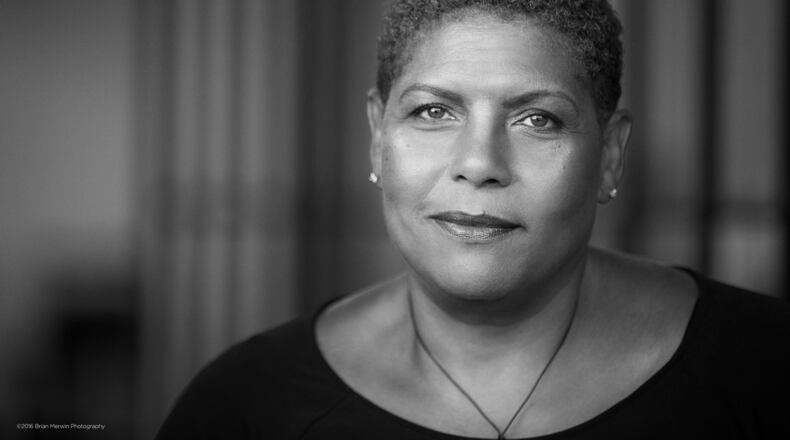That’s a big deal.
Although death rates from breast cancer have been declining for some time now, African American women like Taylor are twice as likely to die from the disease than white women.
That she was also diagnosed with triple-negative breast cancer makes this milestone all the more remarkable. Here’s why.
Triple-negative breast cancer is a cancer that tests negative for the three common receptors typically found in breast cancer. It occurs infrequently but tends to be more aggressive and has fewer treatment options. It is also about twice as common, both in proportion of breast cancers and in incidence rates among black women than white women in the U.S., a factor that is often considered as one contributor to lower breast cancer survival among black patients.
Taylor, a 61-year-old grandmother, was like most people when they hear the C-word. Scared and asking the same question everyone else asks. Why me?
Even if you’ve never heard “You have cancer,” those three words remain some of the most terrifying. The world turns upside down and nothing makes sense.
Interestingly, that moment arrived for Taylor at the worst possible time, she said. Not only was she recently divorced, she had no health insurance.
During a walk with a staff member from the Center for Black Women’s Wellness one morning in 2013, Taylor happened to mention that she hadn’t had her annual mammograms. The center, thanks to the St. Joseph’s mammography mobile, was offering the imaging exam the first Saturday of each month to uninsured and under-insured women, she learned. For working women, the cost was $25; for the unemployed, they were free. When needed, the center also helps women apply for emergency Medicaid.
When the first Saturday in October arrived, Taylor was there.
Days later, she got the call none of us ever wants. They needed more tests.
RELATED | Ladies, this is serious. Are you dense?
Taylor obliged and a few days later got another call to come in for a biopsy. Tests revealed she had stage 0 breast cancer.
Taylor had never heard of stage 0 breast cancer, but she’d met Dr. Rogsbert Phillips while serving on an advisory board. Phillips was considered a breast surgical oncology expert.
When Taylor shared her news with the surgeon, Phillips suggested she get an MRI. Instead of a lumpectomy, Phillips told Taylor the best course of action, given the amount of calcifications in her right breast, was a mastectomy.
Taylor left Dr. Phillips’ office that day and immediately called her new boyfriend Pete and told him the news.
You didn’t ask for this, she told him.
I’m not going anywhere, Pete told her.
Taylor cried.
That was in November. To give Taylor time to take two previously scheduled trips, Phillips scheduled the surgery for January 2014.
Well, we know what happened next.
An ice storm turned Atlanta into a slippery mess, turning the city’s highways into parking lots and stranding thousands of motorists on roads and children in schoolhouses.
“I couldn’t get out of my driveway. (Phillips) couldn’t get out of hers,” Taylor remembered.
They rescheduled and a second snowstorm hit, delaying the surgery until February.
Phillips successfully removed Taylor’s right breast and lymph nodes, but there was more bad news. The cancer wasn’t stage 0, it was stage 2.
And, she learned later, it was triple negative.
RELATED | Atlanta woman knew her cancer wasn't just about her
Over the next six months, she underwent chemotherapy.
“I lost my hair but that was OK,” she said, looking back. “I wore my makeup and had a very good support system. My mom, my two sons, friends and Pete treated me like a queen.”
By September, she was undergoing radiation. Two days before Thanksgiving, she was done. She got a pink ribbon tattooed inside her left wrist to commemorate the moment.
Only problem was the breast removal had left her with a pretty bad case of lymphatic cording and limited mobility of her right arm.
Credit: The Atlanta Journal-Constitution
Credit: The Atlanta Journal-Constitution
As luck would have it, someone told Taylor about TurningPoint Breast Cancer Rehabilitation, a Sandy Springs nonprofit that provides clinical and evidence-based rehabilitation for women with breast cancer, including physical therapy, massage therapy, and counseling.
“They were fantastic,” Taylor said. “They really helped with the healing process and movement of my right arm.”
When we talked last week, Taylor was looking forward to celebrating three years of marriage to Pete. When she looks back on her cancer journey, she said, she wonders why she ever asked why.
“It was to be a voice,” she says now.
Taylor has become quite the spokesperson for breast cancer awareness, representing the Susan G. Komen More Than Pink Campaign, featured on highway billboards and at Hartsfield-Jackson International Airport, and helped develop the Centers for Disease Control and Prevention's breast cancer avatar, a virtual coach that takes questions from people with triple negative breast cancer.
“When I got my mammogram, I didn’t have a lump,” she said. “I didn’t have a bump. I didn’t have drainage. I’ve been able to spread the word about the importance of getting a mammogram and a second opinion. Without that MRI, I would’ve had a lumpectomy. Dr. Phillips saved my life.
“It’s been a journey and it’s a continual journey. Probably not a day goes by that I don’t think of cancer or triple negative, but I try and live my best life every day and help others.”
We’re still a few weeks away from October, when we break out our pink garb and focus on raising awareness about breast cancer and the importance of annual mammograms; when the American Cancer Society reminds us of the tens of thousands of women who will die. That’s some 41,760 this year alone.
This column is early. Let’s just hope it’s early enough to save someone’s life.
Find Gracie on Facebook (www.facebook.com/graciestaplesajc/) and Twitter (@GStaples_AJC) or email her at gstaples@ajc.com.
About the Author
Keep Reading
The Latest
Featured





